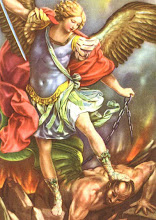Religious Affairs: Jesus's Zionists
Apr. 30, 2009
Matthew Wagner , THE JERUSALEM POST
Like most religious Zionists, Aryeh Bar-David sees the hand of God in the establishment of the Jewish state and the Jewish people's repeated victories against its enemies. Yom Ha'atzmaut has religious meaning as a tangible sign that God is fulfilling his biblical promises to the Jewish people. "God's intervention in the course of history is so clear that, for me, it is absurd that people think we are just another secular democratic country," said Bar-David, who met me on Remembrance Day outside the Old City's Damascus Gate.
"This," said Bar-David, gesturing toward the outer wall of the Old City, "is the manifestation of God's prophecies as stated in Ezekiel, Jeremiah and other places in the Bible," referring to the victory in the Six Day War which gave Israel control of east Jerusalem, including the Old City.
Also similar to many religious Zionists, Bar-David, a veteran of four wars, is convinced that his religious faith helped him cope with life-and-death situations in combat. Under Ariel Sharon, he took part in some of the bloodiest battles for control of the Suez Canal during the Yom Kippur War. As platoon sergeant, Bar-David was forced to take over command when the platoon commander was killed in an ambush. "No matter how dangerous things got, I never feared anything. In a way I had a longing to be in heaven, closer to God. So I was not ever scared by the prospect of dying."
But, unlike most Jewish religious Zionists - who see the establishment of the state as a precursor to the yet-to be-revealed messiah - Bar-David has a radically different eschatology. That's because Bar-David is a Messianic Jew.
"Days are coming when the Jewish people will be forced to realize that Yeshua is the only solution to all our troubles," said Bar-David, using the Hebrew name for Jesus.
Bar-David, 62, is a second-generation Messianic Jew, whose father, a Bulgarian Jew, "came to the faith" while studying in Switzerland and immigrated to Israel before the Holocaust.
Bar-David is one of about 10,000 Messianic Jews living here who believe that Jesus is the messiah and the son of God, and that accepting him as such is a precondition for spiritual redemption. They call themselves Jewish because most were born to a Jewish mother or father.
Still, the belief that Jesus is the messiah who already revealed himself once and will be making a second coming normally places someone squarely outside the Jewish fold. In fact, it is difficult to imagine anything less Jewish. Historically, one of the centerpieces of the Jewish faith was its categorical rejection of Christianity. Throughout the ages since the advent of Christianity, thousands of Jews have preferred martyrdom to accepting Jesus.
But Bar-David and other members of the Messianic community see themselves not only as Jews, but also as ardent Zionists and patriotic Israelis. They reject Christian replacement theology that sees, for instance, the Catholic Church, as the new chosen people. For the Messianic community, the Jewish people are still God's chosen people, even if they rejected Jesus. The establishment of Israel is a tangible manifestation of the prophecies of the Bible. The ingathering of the exiles, the return of the Jewish people to the land of Israel, is part of God's master plan for the final redemption. Fighting in the IDF against Israel's enemies is tantamount to taking part in the fulfillment of biblical prophecies. To be on Israel's side means to be on God's side.
THIS "FAITH-BASED" Zionism is what motivated about 2,000 Messianic Jews and Evangelical Christians from all over Europe including Finland, Norway, Switzerland, France, Germany, Italy and Cyprus to meet in Geneva last week and demonstrate against Durban II.
"I'd say we were probably the largest single pro-Israel contingent in Geneva," said Calev Myers, a Jerusalem-based attorney who heads the Jerusalem Institute of Justice, a legal advocacy group for religious rights that represents mostly Evangelical Christians and Messianic Jews.
Myers, who works in the law firm established by Gideon Hausner, the attorney-general who prosecuted Adolf Eichmann, gave a speech in Geneva in which he strongly defended Zionism and called Iran, China, Libya and other countries that took part in Durban II members of the "fourth Reich."
But Messianic Jews' variety of religious Zionism is not always appreciated. In probably the most violent attack against a Messianic Jew that took place, Ami Ortiz, 15, a dual American-Israeli citizen and the son of a Messianic Jewish pastor, was seriously wounded when a bomb exploded in his home in Ariel on Purim (March 20) last year. The bomb was concealed in a gift basket placed on the doorstep.
This is not an isolated incident. The US State Department's Annual Report on International Religious Freedom, released in September 2008, pointed to a marked rise in violence against Messianic Jews. Some of the incidents mentioned included a public burning of the New Testament in Or Yehuda in May 2008, and the fire-bombing of the Baptist church on Jerusalem's Rehov Narkiss, the meeting place of a Russian-language Messianic Jewish congregation.
Members of the Messianic community are also singled out by the Interior Ministry. For instance, a Christian Chinese couple who came for a pilgrimage was recently detained at Ben-Gurion Airport after they gave border-control officials the name of a Messianic Jew as a contact person here. They were released only after they signed an affidavit assuring they would not proselytize during their visit.
As a result, men like Daniel Yahav, the son of Holocaust survivors who "came to the faith" as a young man and now serves as pastor of a Messianic congregation in Tiberias, are wary of media exposure which might attract unwanted attention. Yahav preferred not to divulge the name of his congregation or its size.
Yahav said that the open animosity some Israelis show toward Messianic Jews does not dampen his or others' Zionist fervor. "We are willing to stand up for our beliefs, even if most Israelis reject them, and that shows our sincerity and faith," said Yahav, who said that he was the first Messianic Jew to become an officer after the IDF changed its exclusionary policies in 1980s.
Do messianic Jews seek out suffering for their faith as a way of emulating Jesus?
"No one wants to suffer," Yahav said. "We want to live a comfortable life like everyone else. Still, when suffering comes, it is a merit, and there will be reward in heaven for it."
AN INTERESTING phenomenon that arises again and again in conversations with Messianic Jews is their strong commitment to military service as part of their loyalty to the state. Yahav said that there are two IAF pilots who are members of his congregation, and several others who belong to elite combat units. The situation is similar at Moshav Yad Hashmona, a small cooperative settlement of about 20 families, most of them Messianic Jews, located west of Jerusalem, according to Ayelet Ronen, its secretary.
Like the Orthodox religious Zionists who see their military service as a mitzva, Messianic Jews also see it in religious terms. In fact, several Messianic Jews said they respected religious Zionists for their selfless service to the state, and felt they had many things in common with them - except, of course, for the belief in Jesus.
Messianic Jews' dedication to the military is based on their belief that one must be a good citizen and pray for the success of the state no matter where one lives. But it also has to do with a type of religious Zionism.
"Part of Messianic community's success in military service has to do with discipline," said Ronen. "We put a lot of emphasis on behavior and conduct. For instance, premarital sex is not accepted, and young people are expected to act in a responsible way. These values seem to help our young people when they get to the IDF.
"Also, our youths are encouraged to reach a deep level of religious conviction independently. Faith is not forced on them. So when someone does commit himself to the faith, it is a result of an internal, not an external, process. And this gives them a lot of strength. But most importantly, we know that when we fight for the Jewish people, we are fighting on God's side."
According to Michael - who helps run Mercaz Netiva, a youth organization for Messianic Jews aged 13 through 17 that includes a one-week premilitary preparation course called Netzor - there are presently 200-300 Messianic Jews serving in the IDF.
Messianic Jews see no contradiction between Jesus's pacifist teachings, such as the Sermon on the Mount, in which the faithful are taught to turn the other cheek to their enemies, and Messianic Jews' service in the IDF.
Michael, who is an officer in the Givati Brigade, believes that Jesus's teachings make military service more of a challenge.
"As believers, we are obligated to love and respect our enemies. But we are also citizens of Israel, which obligates us to serve in the IDF. Every believer has to ask if he is doing what is right and good. The most difficult test is when we are involved in policing the Palestinian population at checkpoints or during patrols inside Palestinian villages.
"I personally see it as an opportunity to behave in a compassionate, ethical way, and serve as a witness for Jesus's teachings. There are about 200 or 300 of us spread out throughout the IDF having a positive impact, serving as examples.
"We believe this state of affairs will not last forever, though. Eventually, there will be a time of peace ushered in by the prince of peace. In that day, everyone will recognize that Jesus is the messiah."
This article can also be read at http://www.jpost.com /servlet/Satellite?cid=1239710831191&pagename=JPArticle%2FShowFull
[ Back to the Article ]
Copyright 1995- 2009 The Jerusalem Post - http://www.jpost.com/
http://www.jpost.com/servlet/Satellite?cid=1239710831191&pagename=JPost%2FJPArticle%2FPrinter
LORD YESHUA HA' MASHIACH ARTICLES AND ARTICLES ABOUT MESSIANIC JEWS JEWS FOR JESUS AND JEWISH CHRISTIANS THE HEBREW CHRISTIANS.
Iscriviti a:
Commenti sul post (Atom)



















Nessun commento:
Posta un commento